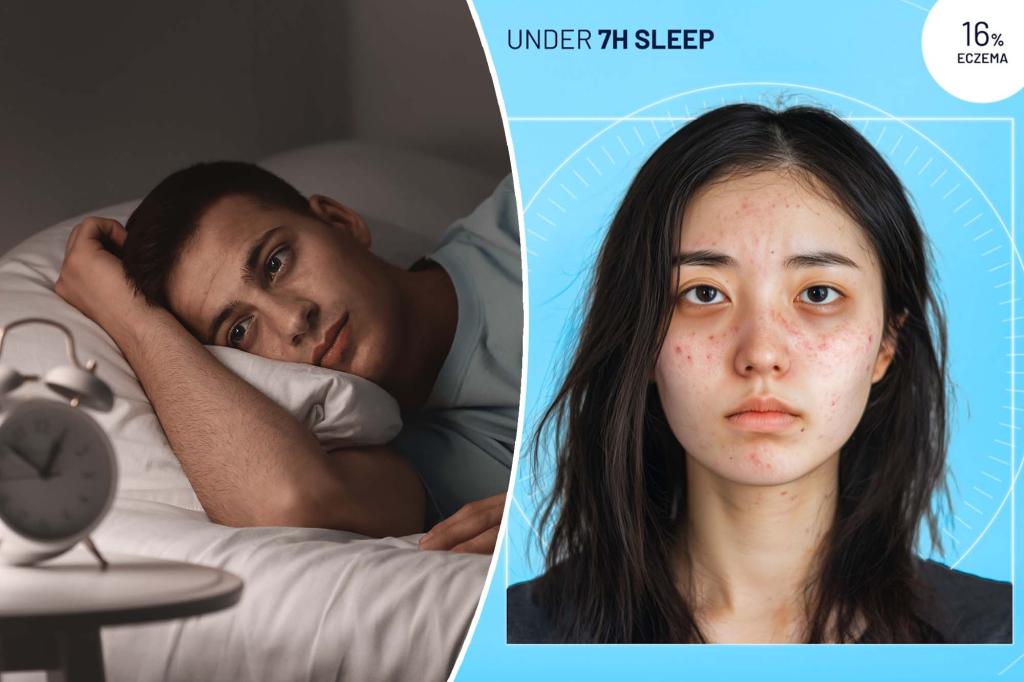The Unexpected Impact of Sleep Deprivation on Your Health and Appearance
Sleep is often viewed as a passive activity, but its effects on our bodies are far from subtle. A recent study by sleep tech company Simba Sleep reveals how a lack of quality rest can have profound consequences on both your health and appearance. From dull, blotchy skin to weight gain and bloating, the findings underscore the importance of prioritizing sleep as a cornerstone of overall well-being.
Skin Struggles: The Visible Toll of Sleep Deprivation
One of the most noticeable effects of sleep deprivation is its impact on the skin. Simba’s study of 2,175 adults across the UK found that over 60% of participants weren’t getting the recommended seven hours of sleep per night. Women were disproportionately affected, with 28% reporting sensitive skin compared to just 17% of men. Other common complaints included fragile nails, uneven skin tone, and a lackluster complexion.
Lisa Artis, deputy CEO of The Sleep Charity, explains that the skin works overtime at night to regenerate and repair itself. However, when sleep is compromised, reduced blood flow can leave the skin looking sallow and lacking its natural vibrancy. The study also found that sleep deprivation can increase cortisol levels, exacerbating inflammatory skin conditions like eczema and psoriasis. For instance, nearly half of participants aged 35 to 44 reported more facial eczema, while 70% of those aged 18 to 34 noticed increased facial dermatitis.
Weight Woes: The Hidden Role of Sleep in Weight Management
The study also highlighted a significant link between sleep deprivation and weight gain. Nearly seven in ten participants with a body mass index (BMI) in the obese category reported sleeping less than seven hours a night, compared to 44% of those in the healthy weight category and 55% of those in the underweight category. Furthermore, 79% of participants who slept less than seven hours a night noted increased fat deposits around their bellies, a trend consistent across both genders.
Artis noted that during sleep, the body balances hormones like ghrelin and leptin, which regulate hunger and satiety. Without adequate rest, ghrelin levels spike, making people feel hungrier, while leptin levels decrease, reducing the feeling of fullness. This hormonal imbalance can lead to late-night snacking, particularly for sugary, high-calorie foods. Women were more likely to give in to these cravings, often using food as a way to cope with stress.
Additionally, sleep deprivation affects fat-storage hormones, leading to gender-specific weight gain patterns. Women are more likely to see increased fat in the hips and thighs due to hormonal changes, while men may notice more abdominal fat due to decreased testosterone levels. These findings emphasize how sleep plays a critical role in maintaining a healthy weight.
Bloating Battles: Fluid Retention and Swelling
Fluid retention and swelling are other common consequences of inadequate sleep. Around 36% of sleep-deprived women complained about bloating compared to half that number among men. Similarly, 15% of women experienced puffy ankles—nearly three times the number of men reporting the same issue. Researchers believe this is linked to sleep deprivation’s impact on the release of vasopressin, a hormone that regulates water expulsion in the body, leading to a swollen appearance.
Chronic lack of sleep can also impair kidney function, making it harder for the body to manage water levels effectively. For women, fluctuating hormone levels during menstrual cycles and menopause may intensify fluid buildup. Men, on the other hand, may experience swelling as a result of compromised cardiovascular health, which could be worsened by lack of sleep.
The Bigger Picture: Sleep Deprivation’s Far-Reaching Health Impacts
Sleep deprivation isn’t just wreaking havoc on your appearance—it’s affecting your entire body. Simba’s study found that 34% of women and 18% of men reported cold feet, while 27% of women also experienced cold hands. Artis explained that body temperature is under circadian control, and sleep loss can impair the body’s ability to manage and adjust its internal temperature, causing fluctuations and discomfort in the hands and other extremities.
Beyond these physical symptoms, sleep deprivation has been linked to a range of chronic health problems, including heart disease, kidney disease, high blood pressure, diabetes, and stroke. It’s also connected to impaired memory and mood swings. According to the Centers for Disease Control and Prevention, about 1 in 3 US adults don’t get enough sleep every day, with an estimated 50 to 70 million Americans suffering from chronic sleep disorders. Even more alarming, nearly 40% of adults report falling asleep unintentionally during the day at least once a month—often leading to tragic accidents. Research suggests that around 17% of fatal car crashes in the US involve a drowsy driver.
Conclusion: Prioritizing Sleep for Better Health
The findings of Simba’s study serve as a wake-up call for anyone neglecting their sleep routine. From dull skin and weight gain to bloating and serious health risks, the consequences of sleep deprivation are far-reaching and undeniable. By understanding the critical role sleep plays in maintaining our physical and mental health, we can take steps to prioritize rest and create healthier sleep habits. After all, a good night’s sleep isn’t just about feeling rested—it’s about living a healthier, more vibrant life.












